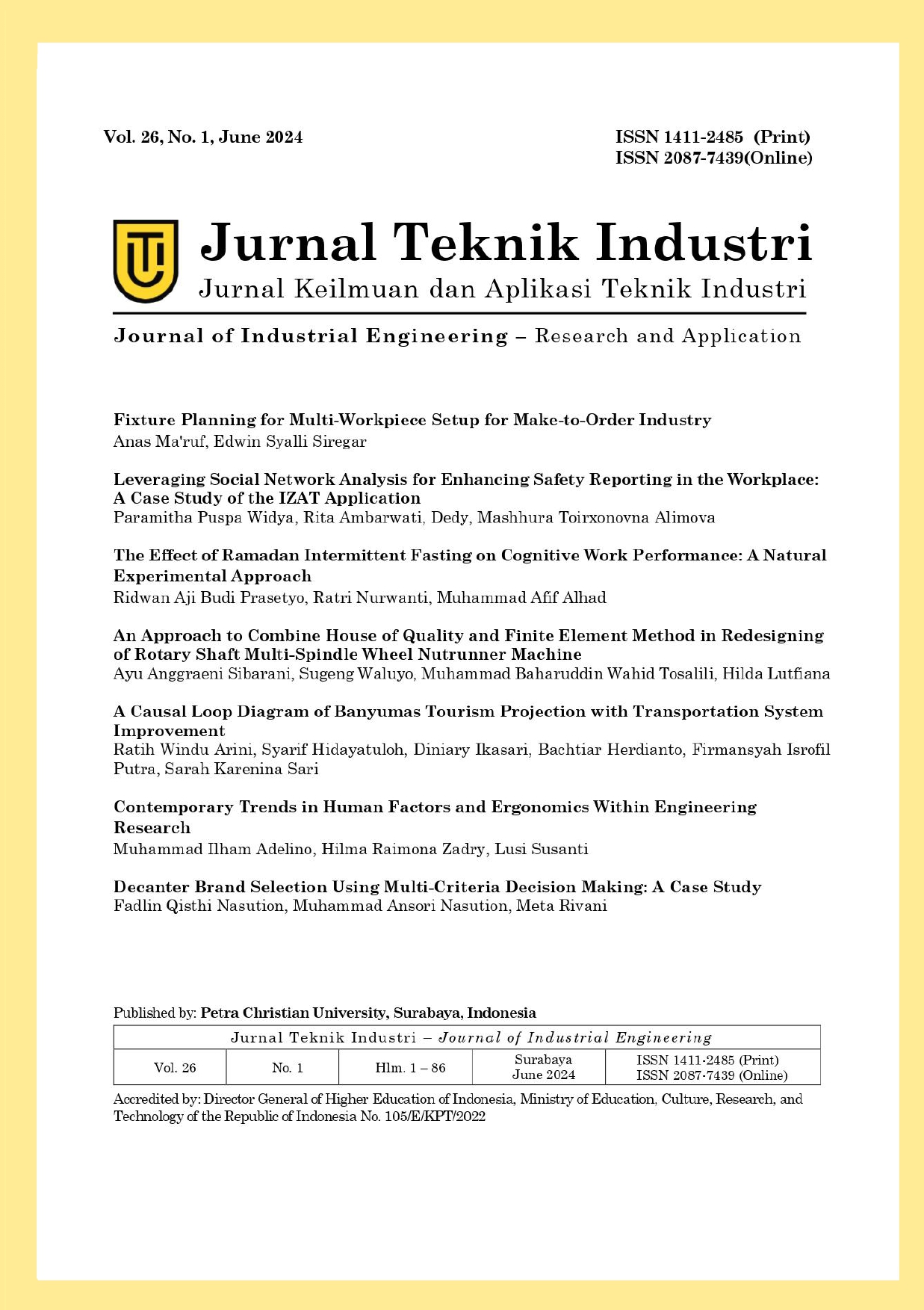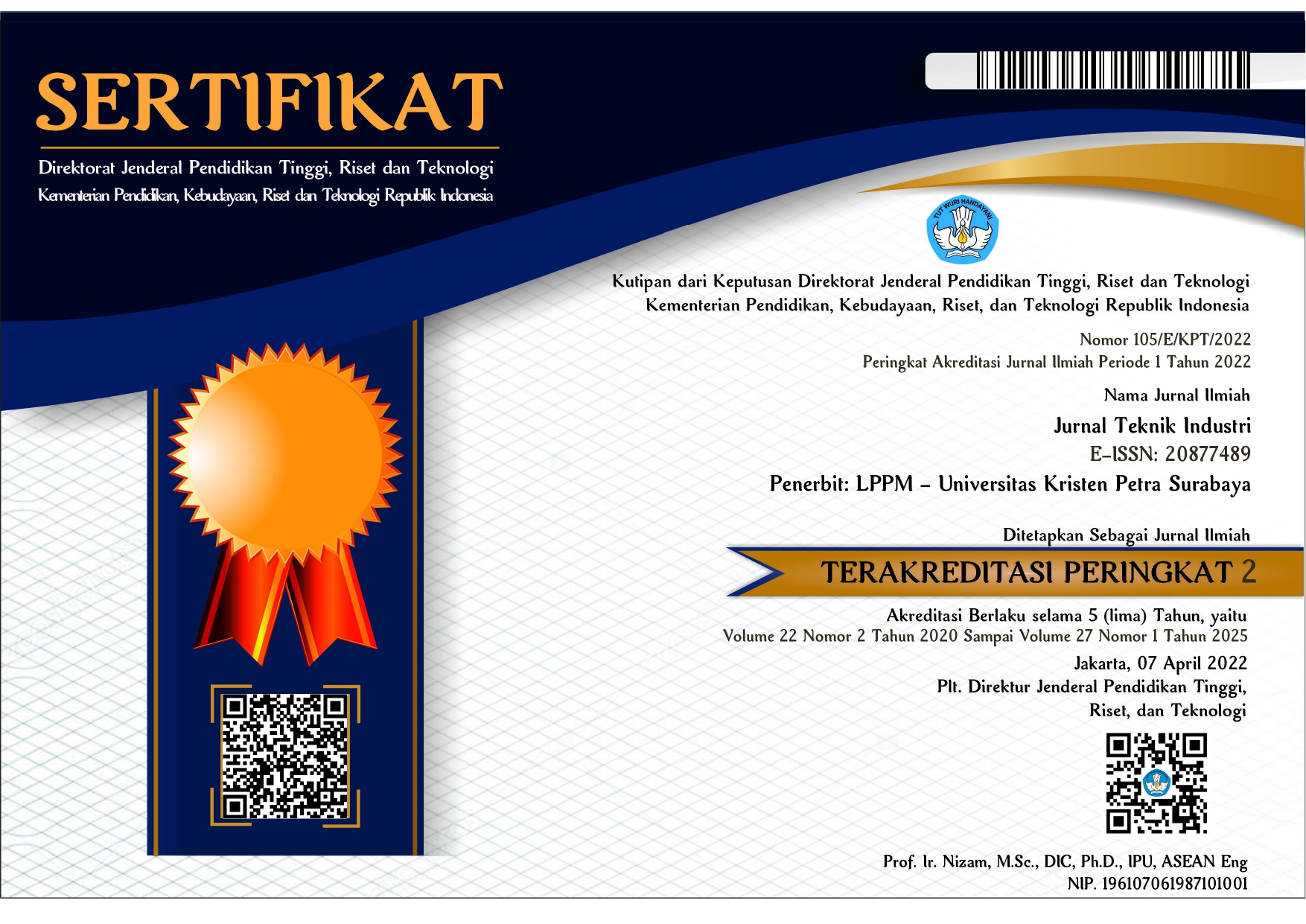The Effect of Ramadan Intermittent Fasting on Cognitive Work Performance
A Natural Experimental Approach
DOI:
https://doi.org/10.9744/jti.26.1.25-36Keywords:
intermittent fasting, natural experiment, cognitive performance, RamadanAbstract
This study aims to investigate the effect of Ramadan intermittent fasting on cognitive work performance using a more natural approach. To achieve the objective of this study, a natural experimental approach was employed by incorporating a pretest-posttest control group design. A forward-type Digit Span Test (DST) was utilized as the measure of the cognitive work performance and was administered to participants twice, before and during Ramadan, with one-month gap between the tests. Two hundred and sixty-seven participants were naturally grouped into fasting and non-fasting groups according to their report during Ramadan session and into morning and afternoon periods, or AM and PM hours, according to their module scheduling. The results of the analyses suggest that the cognitive work performance of the fasting participants during the PM hours is better, after controlling the DST scores before Ramadan. The study also concludes that the cognitive work performance of the fasting participants between AM and PM hours does not differ. This result could be explained using the perspectives of post-lunch performance dip and the beneficial effect of breakfast. Methodological limitations and potential practical implementation of this study are also discussed.
Downloads
References
M. E. Raichle and D. A. Gusnard, "Appraising the brain’s energy budget", Proceedings of the National Academy of Sciences, vol. 99, no. 16, pp. 10237–10239, 2002, doi: https://doi.org/10.1073/pnas.172399499.
M. Sprengell, B. Kubera, and A. Peters, "Brain more resistant to energy restriction than body: A systematic review", Frontiers in Neuroscience, vol. 15, 2021, Accessed: Feb. 03, 2023. [Online]. Available: https://www.frontiersin.org/articles/10.3389/fnins.2021.639617
F. Kalam et al., "Beverage intake during alternate-day fasting: Relationship to energy intake and body weight", Nutrition and Health, vol. 25, no. 3, pp. 167–171, 2019, doi: https://doi.org/10.1177/0260106019841452.
E. Ogłodek and W. Pilis, Prof., "Is water-only fasting safe?", Global Advances in Integrative Medicine and Health, vol. 10, p. 216495612110311, Jan. 2021, doi: https://doi.org/10.1177/21649561211031178.
Y. Yassierli, A. N. Aisha, and A. G. Nugraha, "Pengembangan alat pengukuran kelelahan mental berbasis uji flicker", Jurnal Teknik Industri: Jurnal Keilmuan dan Aplikasi Teknik Industri, vol. 18, no. 1, pp. 11–20, Jun. 2016, doi: https://doi.org/10.9744/jti.18.1.11-20.
S. Khemila et al., "Effects of Ramadan fasting on the diurnal variations of physical and cognitive performances at rest and after exercise in professional football players", Front. Psychol., vol. 14, p. 1148845, Mar. 2023, doi: https://doi.org/10.3389/fpsyg.2023.1148845.
M. Crhová and K. Kapounková, "Influence of long-term fasting and intermittent fasting on the cognitive abilities", Studia Sportiva, vol. 14, no. 1, pp. 15–22, Sep. 2020, doi: https://doi.org/10.5817/StS2020-1-2.
E. Kemps and M. Tiggemann, "Working memory performance and preoccupying thoughts in female dieters: Evidence for a selective central executive impairment", British Journal of Clinical Psychology, vol. 44, no. 3, pp. 357–366, Sep. 2005, doi: https://doi.org/10.1348/014466505X35272.
A. R. Aziz, M. F. Wahid, W. Png, and C. V. Jesuvadian, "Effects of Ramadan fasting on 60 min of endurance running performance in moderately trained men", British Journal of Sports Medicine, vol. 44, no. 7, pp. 516–521, Jun. 2010, doi: https://doi.org/10.1136/bjsm.2009.070425.
S. A. Margolis and R. L. Reed, "Effect of religious practices of Ramadan on sleep and perceived sleepiness of medical students", Teaching and Learning in Medicine, vol. 16, no. 2, pp. 145–149, Apr. 2004, doi: https://doi.org/10.1207/s15328015tlm1602_5.
A. V. Witte, M. Fobker, R. Gellner, S. Knecht, and A. Flöel, "Caloric restriction improves memory in elderly humans", Proceedings of the National Academy of Sciences U.S.A., vol. 106, no. 4, pp. 1255–1260, Jan. 2009, doi: https://doi.org/10.1073/pnas.0808587106.
M. A. Boujelbane et al., "Time-restricted feeding and cognitive function in sedentary and physically active elderly individuals: Ramadan diurnal intermittent fasting as a model", Front. Nutr., vol. 9, p. 1041216, Nov. 2022, doi: https://doi.org/10.3389/fnut.2022.1041216.
A. M. Alsharidah, G. Murtaza, M. M. Alsharidah, and S. Bashir, "Fasting in Ramadan affects cognitive and physiological function in normal subjects (pilot study)", Neuroscience and Medicine, vol. 07, no. 02, pp. 60–65, 2016, doi: https://doi.org/10.4236/nm.2016.72007.
M. S. Shrunga, A. Shamooda, and F. Shaniba, "Effect of fasting on cognitive functioning in healthy young adults", Journal of Health and Allied Sciences NU, vol. 07, no. 04, pp. 021–024, Dec. 2017, doi: https://doi.org/10.1055/s-0040-1708731.
M. Jia, L. Shi, Y. Zhao, X. Hu, J. Zhao, C. Ding, Y. Shang, X. Li, X. Jin, X. Dai, X. Liu, and Z. Liu, "Intermittent fasting mitigates cognitive deficits in Alzheimer’s disease via the gut-brain axis", Animal Behavior and Cognition, preprint, May 2022. doi: https://doi.org/10.1101/2022.05.11.491466.
V. Rajeev, D. Y. Fann, Q. N. Dinh, H. A. Kim, T. M. D. Silva, D-G. Jo, G. R. Drummond, C. G. Sobey, M. K. P. Lai, C. L-H. Chen, and T. V. Arumugam, "Intermittent fasting attenuates hallmark vascular and neuronal pathologies in a mouse model of vascular cognitive impairment", International Journal of Biological Sciences, vol. 18, no. 16, pp. 6052–6067, 2022, doi: https://doi.org/10.7150/ijbs.75188.
M. Ghayour Najafabadi, L. Rahbar Nikoukar, A. Memari, H. Ekhtiari, and S. Beygi, "Does Ramadan fasting adversely affect cognitive function in young females?", Scientifica, vol. 2015, p. e432428, Nov. 2015, doi: https://doi.org/10.1155/2015/432428.
M. H. AlSheikh et al., "Assessing causality in the association between neurocognitive gains and fasting", European Review for Medical and Pharmacological Sciences, vol. 27, no. 2, pp. 540–546, Jan. 2023, doi: https://doi.org/10.26355/eurrev_202301_31055.
P. Craig et al., "Using natural experiments to evaluate population health interventions: New MRC guidance", Journal of Epidemiology & Community Health, vol. 66, no. 12, pp. 1182–1186, Dec. 2012, doi: https://doi.org/10.1136/jech-2011-200375.
B. E. Roe and D. R. Just, "Internal and external validity in economics research: tradeoffs between experiments, field experiments, natural experiments, and field data", American Journal of Agricultural Economics, vol. 91, no. 5, pp. 1266–1271, Dec. 2009, doi: https://doi.org/10.1111/j.1467-8276.2009.01295.x.
H. L. Blackburn and A. L. Benton, "Revised administration and scoring of the digit span test", Journal of Consulting Psychology, vol. 21, no. 2, pp. 139–143, 1957, doi: https://doi.org/10.1037/h0047235.
A. R. A. Conway, M. J. Kane, M. F. Bunting, D. Z. Hambrick, O. Wilhelm, and R. W. Engle, "Working memory span tasks: A methodological review and user’s guide", Psychonomic Bulletin & Review, vol. 12, no. 5, pp. 769–786, Oct. 2005, doi: https://doi.org/10.3758/BF03196772.
G. E. Gignac and L. G. Weiss, "Digit span is (mostly) related linearly to general intelligence: Every extra bit of span counts", Psychological Assessment, vol. 27, no. 4, pp. 1312–1323, 2015, doi: https://doi.org/10.1037/pas0000105.
V. Pina, L. J. Fuentes, A. Castillo, and S. Diamantopoulou, "Disentangling the effects of working memory, language, parental education, and non-verbal intelligence on children's mathematical abilities", Front. Psychol., vol. 5, May 2014, doi: https://doi.org/10.3389/fpsyg.2014.00415.
R. Ruchinskas, "Wechsler adult intelligence scale-4th edition digit span performance in subjective cognitive complaints, amnestic mild cognitive impairment, and probable dementia of the Alzheimer type", The Clinical Neuropsychologist, vol. 33, no. 8, pp. 1436–1444, 2019, doi: https://doi.org/10.1080/13854046.2019.1585574.
R. D. Shura, S. L. Martindale, K. H. Taber, A. M. Higgins, and J. A. Rowland, "Digit span embedded validity indicators in neurologically-intact veterans", The Clinical Neuropsychologist, vol. 34, no. 5, pp. 1025–1037, Jul. 2020, doi: https://doi.org/10.1080/13854046.2019.1635209.
J. L. Varela, A. S. Ord, J. I. Phillips, R. D. Shura, and S. W. Sautter, "Preliminary evidence for digit span performance validity indicators within the neuropsychological assessment battery", Applied Neuropsychology: Adult, pp. 1–7, May 2022, doi: https://doi.org/10.1080/23279095.2022.2076602.
G. Stoet, "PsyToolkit: A software package for programming psychological experiments using Linux", Behavior Research Methods, vol. 42, no. 4, pp. 1096–1104, 2010, doi: https://doi.org/10.3758/BRM.42.4.1096.
G. Stoet, "PsyToolkit: A novel web-based method for running online questionnaires and reaction-time experiments", Teaching of Psychology, vol. 44, no. 1, pp. 24–31, 2017, doi: https://doi.org/10.1177/0098628316677643.
P. Dugard and J. Todman, "Analysis of pre‐test‐post‐test control group designs in educational research", Educational Psychology, vol. 15, no. 2, pp. 181–198, 1995, doi: https://doi.org/10.1080/0144341950150207.
R Core team, R: A Language and Environment for Statistical Computing, Viena, Austria, 2021, https://www.r-project.org
A. Ghasemi and S. Zahediasl, "Normality tests for statistical analysis: A guide for non-statisticians’, International Journal of Endocrinology and Metabolism, vol. 10, no. 2, pp. 486–489, 2012, doi: https://doi.org/10.5812/ijem.3505.
M. Schröder, K. Müller, M. Falkenstein, P. Stehle, M. Kersting, and L. Libuda, "Lunch at school and children’s cognitive functioning in the early afternoon: Results from the Cognition Intervention Study Dortmund Continued (CoCo)", British Journal of Nutrition, vol. 116, no. 7, pp. 1298–1305, Oct. 2016, doi: https://doi.org/10.1017/S0007114516002932.
A. P. Smith and C. Miles, "Effects of lunch on selective and sustained attention", Neuropsychobiology, vol. 16, no. 2–3, pp. 117–120, Feb. 2008, doi: https://doi.org/10.1159/000118309.
J. Dhillon, S.-Y. Tan, and R. D. Mattes, "Effects of almond consumption on the post-lunch dip and long-term cognitive function in energy-restricted overweight and obese adults", British Journal of Nutrition, vol. 117, no. 3, pp. 395–402, Feb. 2017, doi: https://doi.org/10.1017/S0007114516004463.
M. Defeyter and R. Russo, "The effect of breakfast cereal consumption on adolescents’ cognitive performance and mood", Frontiers in Human Neuroscience, vol. 7, 2013, Accessed: Nov. 08, 2023. [Online]. Available: https://www.frontiersin.org/articles/10.3389/fnhum.2013.00789
L. Dye, A. Lluch, and J. E. Blundell, "Macronutrients and mental performance", Nutrition, vol. 16, no. 10, pp. 1021–1034, Oct. 2000, doi: https://doi.org/10.1016/S0899-9007(00)00450-0.
G. C. Rampersaud, M. A. Pereira, B. L. Girard, J. Adams, and J. D. Metzl, "Breakfast habits, nutritional status, body weight, and academic performance in children and adolescents", Journal of the American Dietetic Association, vol. 105, no. 5, pp. 743–760, May 2005, doi: https://doi.org/10.1016/j.jada.2005.02.007.
A. C. Hill, A. R. Laird, and J. L. Robinson, "Gender differences in working memory networks: A BrainMap meta-analysis", Biological Psychology, vol. 102, pp. 18–29, Oct. 2014, doi: https://doi.org/10.1016/j.biopsycho.2014.06.008.
P. Ibbotson and E. Roque-Gutierrez, "The development of working memory: Sex differences in accuracy and reaction times", Journal of Cognition and Development, vol. 24, no. 4, pp. 581–597, Aug. 2023, doi: https://doi.org/10.1080/15248372.2023.2178437.
L. Gangadharan, T. Jain, P. Maitra, and J. Vecci, "Lab-in-the-field experiments: Perspectives from research on gender", The Japanese Economic Review, vol. 73, no. 1, pp. 31–59, Jan. 2022, doi: https://doi.org/10.1007/s42973-021-00088-6.
Downloads
Published
How to Cite
Issue
Section
License
Copyright (c) 2024 Ridwan Aji Budi Prasetyo, Ratri Nurwanti, Muhammad Afif Alhad

This work is licensed under a Creative Commons Attribution 4.0 International License.
Articles published in the Jurnal Teknik Industri: Jurnal Keilmuan dan Aplikasi Teknik Industri will be Open-Access articles distributed under the terms and conditions of the Creative Commons Attribution License (CC BY).
![]()
This work is licensed under a Creative Commons Attribution License (CC BY).



















